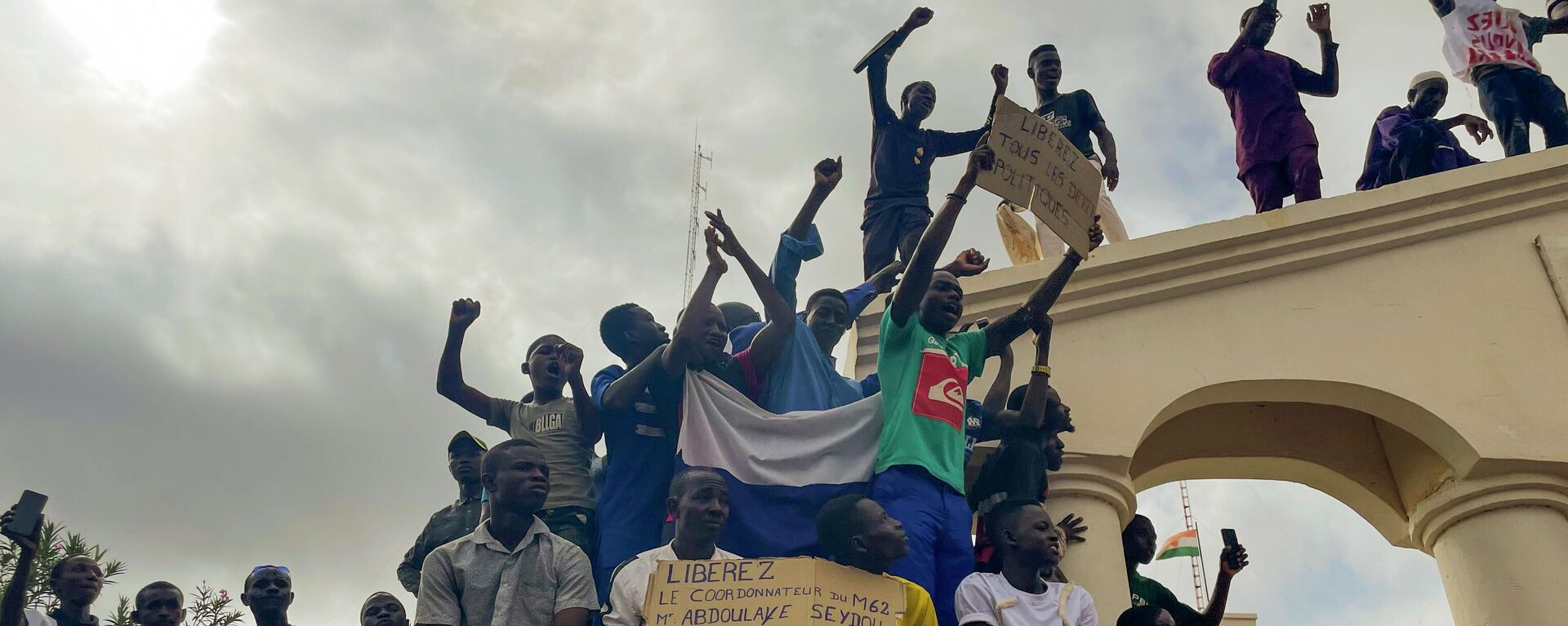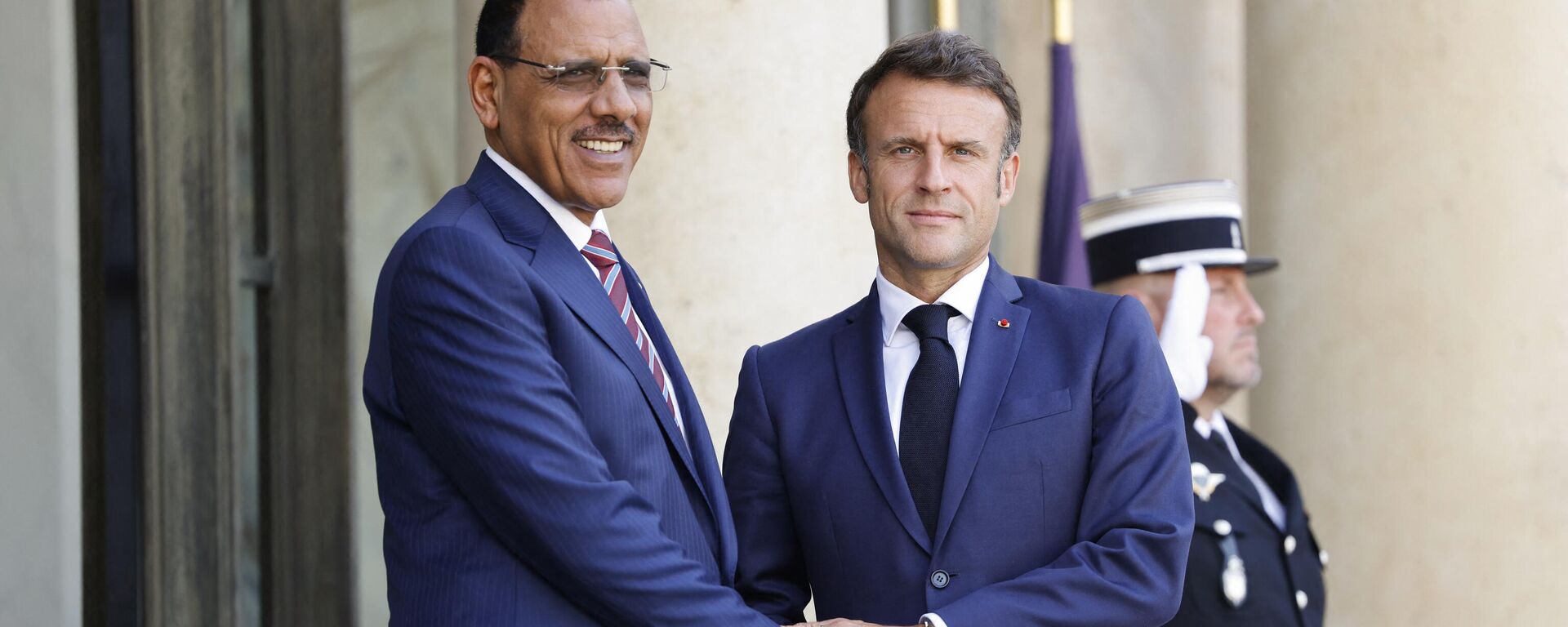ICRC Says Will Keep Providing Aid to People in Mali's Hard-to-Reach Areas
11:04 08.08.2023 (Updated: 11:26 08.08.2023)

© AFP 2024 AHMED OUOBA
Subscribe
MOSCOW (Sputnik) - The International Committee of the Red Cross (ICRC) will continue to provide all necessary assistance to vulnerable communities living in Mali's hard-to-reach areas and facing the combined effects of armed clashes, displacement and climate change.
Mutsa Mugangavari, the deputy head of the ICRC regional delegation in Southern Africa, told Sputnik that the organization's support will be "extended to people displaced and the host communities, particularly in the hard-to-reach areas where fewer humanitarian actors work."
"We will continue answering the population's needs in the best possible way and within our capacities, through protection, assistance, and resilience building humanitarian programs," Mugangavari said.
It is Mali where the ICRC has been focusing most of its operations over the past 32 years, she noted, adding that despite the assistance provided, the humanitarian situation in the country's conflict-torn areas remained worrying, with local residents forced to live under increased pressure on natural resources, livelihoods and basic services.
Speaking about the ICRC's efforts in Mali, Mugangavari mentioned the organization's support of hospitals in the regions of Gao and Mopti, as well as of reference health centers in the communes of Kidal and Menaka, where the committee has permanent medical and surgical teams.
"Between January and June 2023, this enabled over 40,160 injured patients, including emergencies, to access free healthcare services," she said.
In total, the ICRC supports 25 community health centers in Mali's most affected areas by providing drugs, consumables, equipment, medical evacuations, capacity-building and payment of incentives to medical staff, Mugangavari told Sputnik.
Moreover, the necessary medical aid is also supplied to the Malian physical rehabilitation center and its three branches in Mopti, Timbuktu and Gao, the deputy head of the ICRC regional delegation said.
"This enables people who have been physically impacted by the conflict to get fitted with prosthetics and walking aids, and receive physiotherapy sessions. The ICRC also supports the Pere Bernard Verspieren center in Bamako. Between January and June 2023, 405 patients were fitted with prosthetics in those five centers," Mugangavari added.
An armed conflict between government forces, militants of separatist movements and Islamist groups began in Mali in 2012 and is still ongoing. Over a decade of violent clashes in the country has resulted in continued insecurity, climatic shocks, massive displacements and a catastrophic humanitarian situation. The UN estimates that around 8.8 million people in Mali need humanitarian assistance.
ICRC Reshapes Activities in Libya
People in Libya are still bearing the brunt of the protracted civil war on the country's economy, environment and healthcare system, prompting the International Committee of the Red Cross to adapt its activities to the situation, Mugangavari said.
"Libya is now experiencing the consequences of a protracted crisis, with less emergency needs and more long-term needs to withstand and adapt to these consequences. The ICRC has adjusted its activities so that they focus on reinforcing the capacity of the most vulnerable people and of essential services to cope with decreased economic resources and damages to infrastructure, while at the same time retaining an ability to support a response to acute needs that may still occur," she said.
The UN estimates that nearly 300,000 people in Libya need humanitarian assistance, and although some displaced persons are believed to be able to return to their places of origin in recent years, which allegedly may signal an improved security situation in various locations, an estimated 143,000 people still remain in displacement, the deputy head of the ICRC regional delegation stated.
"The extensive explosive hazard contamination continues to pose a threat to the lives and livelihoods of civilians living in their vicinity and acts as a major impediment to the return of displaced populations," Mugangavari explained, adding that infrastructure and services were gradually deteriorating with regard to health, water and sanitation.
Libya has been grappling with multiple crises after the 2011 Western military intervention overthrew its longtime leader Muammar Gaddafi and created a power vacuum that split the nation into rival factions.
The UN estimates that the conflict in Libya has forced about a million people from their homes, with the vast majority struggling to meet their basic needs, maintain health and feel safe. Although some of those displaced have returned to places of their origin in recent years, the population is still dealing with the negative consequences of the hostilities and ongoing clashes and living in conditions of an acute humanitarian crisis.
Plans to Intensify Efforts in Burkina Faso
According to Mugangavari, the ICRC is planning to intensify its efforts in Burkina Faso to help internally displaced persons and those affected by the persisting humanitarian crisis in the country.
"The humanitarian situation in Burkina Faso remains worrying and the ICRC, in collaboration with the Burkinabe Red Cross, intends to intensify its actions for as long as necessary, in order to save lives and provide relief to people affected by armed violence," Mugangavari told Sputnik.
The gravity of the problem is evident, as the number of internally displaced persons (IDPs) in Burkina Faso surged from 47,000 in December 2018 to over 2 million in July 2023, the deputy head of the ICRC regional delegation stated, adding that of this number, 58% were children, while women represented 23%.
"Internal displacements in Burkina Faso are more and more prolonged and multiple. This was not the case two or three years ago. As a result, IDPs depend primarily on humanitarian aid to meet their most basic needs, especially food and water. Armed violence also affects the access of affected populations to health services at all levels," Mugangavari said.
In this regard, she noted that the work of the ICRC and the Burkinabe Red Cross Society as neutral and impartial humanitarian organizations was essential for the nation, since without their efforts and support of the local authorities, the affected communities living in landlocked areas would not be able to survive.
Thanks to the assistance provided by the ICRC, 38,234 IDPs benefited from the distribution of food in-kind and 2,513 people received food rations in cash from January to April 2023, Mugangavari told Sputnik.
Moreover, 123,743 consultations were carried out and 246 injured were treated in hospital facilities supported by the organization. In addition, 10,000 IDPs and residents benefited from better access to drinking water, following the rehabilitation of 19 boreholes and the construction of a new one in the region, the deputy head of the ICRC regional delegation added.
Burkina Faso has been torn by an armed conflict between the government and Islamist rebels since 2015. Moreover, regular clashes happen between representatives of local communities. Ongoing violence has resulted in poverty, inequalities, food insecurity, and environmental change, with 4.7 million people across the country being in dire need of humanitarian assistance, the UN Refugee Agency estimates.



